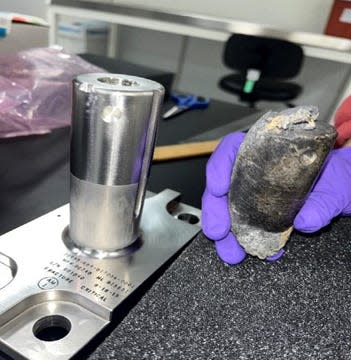When space junk plummets to Earth and causes damage or injury, who pays?
When a Florida family filed a claim against NASA over "space junk" that fell through their roof earlier this year, they launched a potentially precedent setting question: Who is liable when debris from space causes damage or injury?
Nobody was hurt when a cylindrical object that was part of a pallet of used batteries from the International Space Station came sailing through Alejandro Otero and his family's roof in what their attorney called a "near miss," but the claim for a reported $80,000+ includes uninsured property damage and emotional anguish.
Space junk – any of the millions of pounds of objects left by humans in space ranging from small nuts and bolts to pieces of defunct satellites – falls into Earth's atmosphere every day. The vast majority of it burns up on its way down, but every so often, pieces fall to the surface. They land in oceans, which cover most of Earth's surface, and other unpopulated places on land.
Very rarely, they have caused damage or minor injury, but experts say a growing amount of junk in space means those occurrences may happen more frequently in the future.
So who should pay in a case like the Oteros', and how worried should people be about space objects hurtling toward them?
This is an "unprecedented" situation, said Michelle L.D. Hanlon, the director of the Center for Air and Space Law at the The University of Mississippi School of Law.
"It's a really fascinating story," Hanlon told USA TODAY. "I don't think it's going to happen to you, but I hope it does get people to think about space, because space is an integral part of our lives, and it's just going to become even more so."
Who pays when space debris causes damage on Earth?
There is an international treaty to deal with just such an event. It says that if space junk falls to Earth and causes damage or injury, whatever country launched the debris is responsible, without anyone having to prove that negligence caused it, Hanlon said.

However, it doesn't apply when a country's own space object causes harm to its own citizens. The piece that came through the family's house in Florida from the ISS was U.S. space junk, so the family had to file a claim through the Federal Tort Claims Act, the process by which U.S. citizens can sue the federal government, which requires them to prove there was negligence, Hanlon said.
NASA has six months to respond to the claim. The agency can choose to settle with the family, Hanlon said, or the case would go to court, and the outcome could set a precedent for future space junk cases in the U.S.
"It's very interesting situation, because there's no way to actually prove negligence," Hanlon said, adding that it would be impossible to send inspectors up to the space station to evaluate and that NASA's analyses led it to believe the pallet released in 2021 would orbit Earth for a few years before burning entirely up on re-entry to Earth's atmosphere.
Space is getting crowded with junk, so this could happen again
NASA estimates there are 17.6 million pounds of objects in Earth's orbit, and the amount of space junk is only expected to increase.
While the risk of being struck by some of the debris is low – about 1 in 100 billion – there have been documented cases of minor injury resulting from falling space junk. In 1997, Oklahoman Lottie Williams was famously hit but not hurt by a falling piece of a U.S. Delta II rocket while she was at a park.
Waste in space:Why junk in Earth orbit is becoming a huge problem
"It's going to happen again," Hanlon said of potential future liability claims because of falling space junk. "It's not like the sky is falling ... but it's going to happen more and more."
Contributing: Janet Loehrke and Gabe Hauari, USA TODAY; Dave Osborn, USA TODAY Network-Florida
This article originally appeared on Mississippi Clarion Ledger: When space junk causes damage on Earth, who pays? Ole Miss Law answers
